I was marching in Zagreb with fAKTIV last year. Emotional and powerful, the Night March that they organised gathered between 6000 and 8000 people, more than anyone could have imagined. The protest was the consolidation of a number of years of mobilisation, a symptom of feminist anger in Croatia that is growing bigger with every day. Ahead of this year’s march we spoke to them about the history of the movement and significance of International Women’s Day.
For those outside of the Croatian context, can you explain how and when fAKTIV started to act?
fAKTIV is a feminist collective fighting for women’s, worker’s, and social rights, for reproductive and sexual rights, and against gender based violence targeted at women. We started to act in 2016 during a rapid increase in fascistic and clerical tendencies, as well as attacks against civil society and non-profit media platforms in Croatia. fAKTIV was developed from an ad hoc initiative organized around the notion that society and the state need to take full responsibility for the violence and murders of women. Our group emerged from an organizational committee of the very first Night March, 8 March 2016. We often like to point out that we were developing the march, but at the same time the march was developing us.
Although our first intention was to act against violence on women, the field of our work soon expanded towards a wider non-institutionalised feminist support of the anti capitalist movement. The Night March is the largest and the most visible feminist protest (in 2017 it was the largest women’s rights protest in Croatia for 25 years) but besides the march, we are also organizing discussions, workshops, smaller protest actions, guerrilla actions and of course, we are quite active and recognizable users of social media.
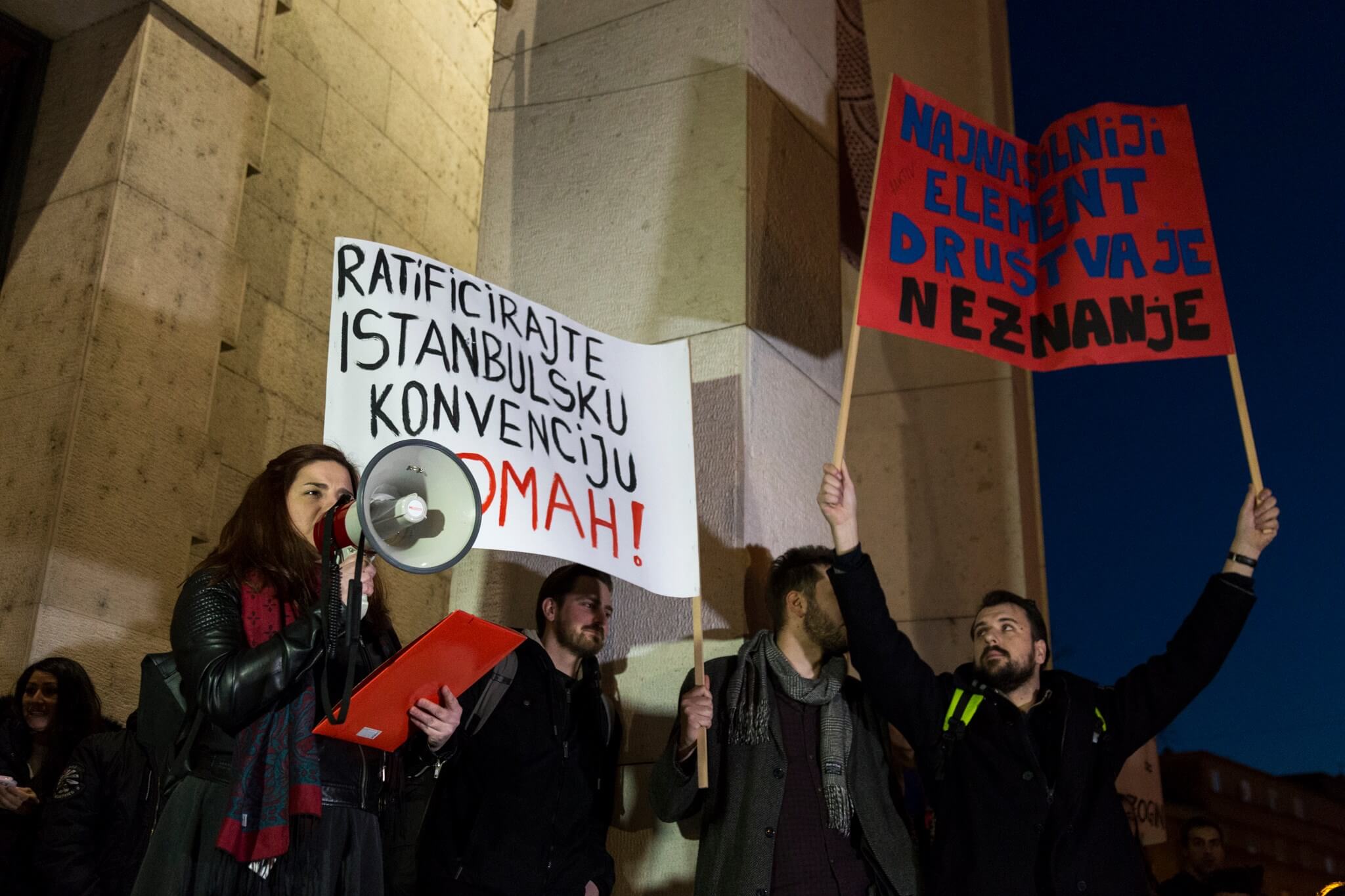
The keywords for this year’s march are “anger”, “resistance” and “change”. Presumably, this is in response to everything that happened in Croatia during the last year. If we look back in 2017, how were the lives of women affected by the political climate in Croatia?
Since 2013 we can clearly see how the impact of fundamentalist groups closely connected with the Catholic Church has grown. In 2017, HDZ, the Croatian Democratic Union, a right wing conservative political party, again came to power. That actually allowed the aforementioned groups to infiltrate into decision-making positions. Stronger and more aggressive than ever before, they started to spread their impact: in the media, education, health, social policies and many other fields.
If we are talking about lives of women, this means that, in 2017, the emphasis was on the demographic renewal, obstruction of the ratification of the Istanbul Convention and relativization of the violence against women, potential changes in abortion legislation, obstruction of the curriculum reform and constant attacks on non-profit media and human rights organizations. As a result in Croatia, the confining of women to traditional is making a big comeback. Society is returning to patriarchal roots, and on top of everything public services are being privatized. Of course, the state will exclude and marginalize everyone who disagrees.
This is why we need 8 March – a day when we take to the streets, when we show our resistance. To fight for abortion rights, for a free and good public health system, for accessible public services, education, guaranteed employment, solidary housing and pension policy. We are continuously pressuring the government, especially the Prime Minister Andrej Plenković and the minister of Demography, Family, Youth and Social Policy, Nada Murganić. He [Andrej] is openly lying about the ratification of the Istanbul Convention while she [Nada], is sending a message to women to endure domestic violence and keep it within the four walls of the home.
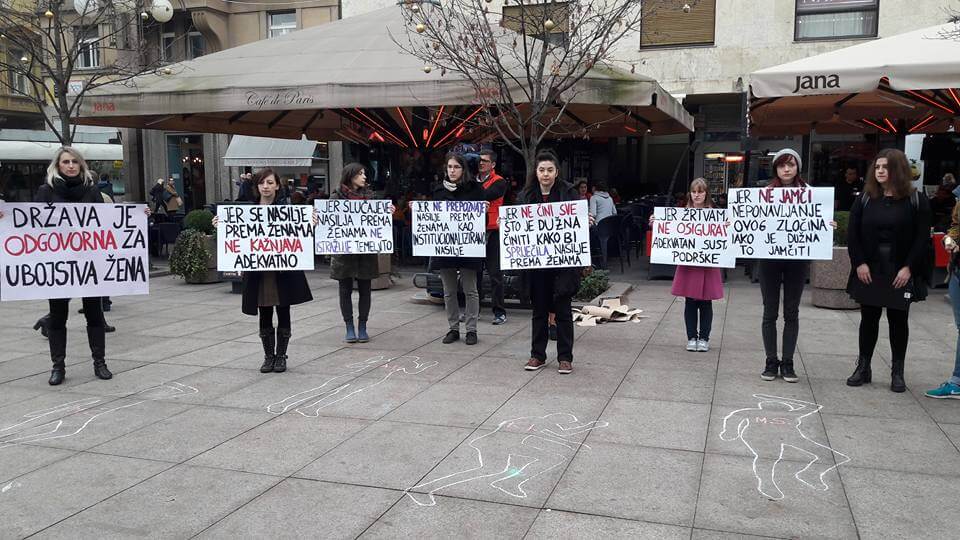
One could label you a fresh initiative that brought a certain refreshing power to the feminist activist scene in Croatia, but I would rather say that your impact is realized through a form of disobedience. To clarify, since the 90s, the celebration of International Women’s Day lost its political sharpness. Instead, we have been encouraged to celebrate Valentine’s and Mother’s Day as alternatives. Can you explain this change, and the particular signifiance of the 8 March in former Yugoslavia?
Well, we are both fresh and disobedient. Despite the 8 March amnesia in Croatian society, other feminist organizations in Croatia in the past 25 years have been celebrating International Women’s Day. They continued to fight against the ridiculous transformation of a day, once empowering women, and which is now just an excuse to give them flowers. They were still addressing the issues women are facing and pressuring the institutions but the protests weren’t massive, which is why we realized that this was the perfect time to react. Two years later, it’s clear that the idea of the Night March was indeed necessary for the feminist movement in Croatia and for a stronger citizen’s mobilization around women’s rights and everyday struggles in the country.
The history of the 8 March celebration in Yugoslavia from the very first celebrations in the interwar period had a clear purpose. During the 1920s activities included printing leaflets about the position of women workers in the Kingdom of Yugoslavia comparing them with those in the Soviet Union. The Union meetings in the factories on 8 March would eventually grow into massive protests and celebrations and would include women from different classes united by the same goals: demanding political equality, equal salaries for equal work and better working conditions. A particular effort was the celebration of 1941 when women organized rallies in front of the factories, protesting against war and high living costs, demanding “equal pay for equal work, protection of the mothers and children, and against the war where workers, sons, husbands and brothers are dying.”
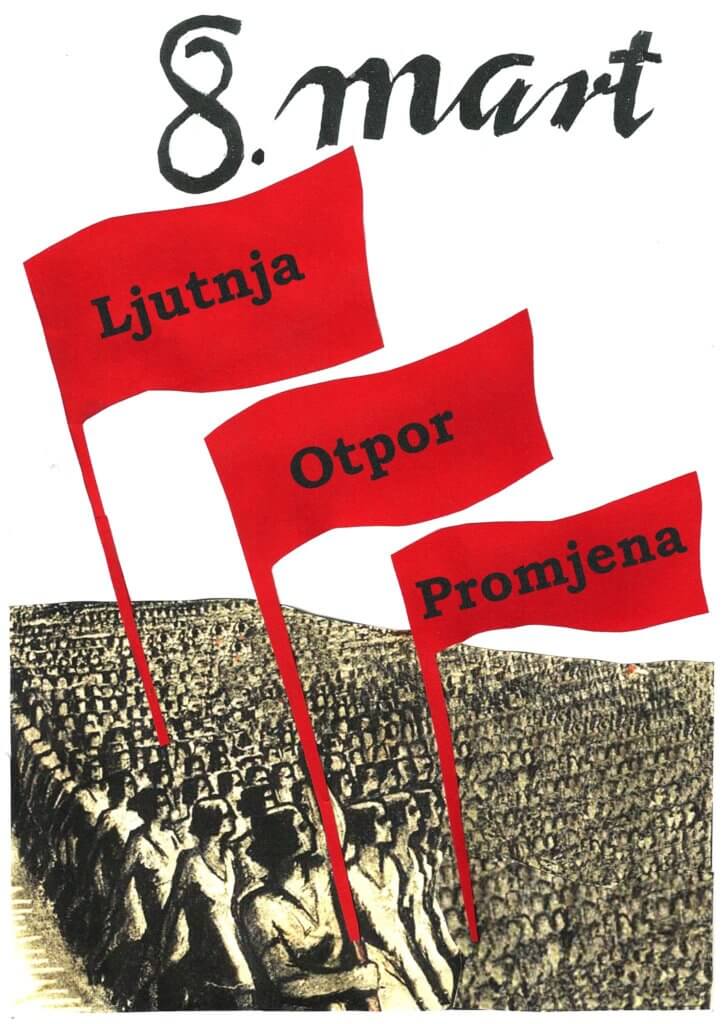
The importance of the celebration was especially established around AFŽ – The Women’s Antifascist Front, a World War II feminist movement and female political organization that spread across Yugoslavia. In 1944, a celebration lasted the whole month and the tradition was re-established later in the newly formed Yugoslavia. During the period after the war, the celebration was mainly focused on reconstruction and providing better living conditions, but always stressing the importance of the women’s role in the process of the industrialization of the country. Sadly, the archive materials later analyzed by the women’s organizations that were the successors of the AFŽ show attempts at a disconnection from the roots, diminishing its combativeness and strong political purpose. In later years, women’s organizations tried to return to the revolutionary origins of 8 March, strongly criticized the recently imported celebration of Mother’s Day and instead pushed the agenda of a meaningful women’s struggle for political and social rights from the past. Nonetheless further depoliticisation and the trivialization of the celebration were still widepsread in public discourse.
Although this is not an isolated issue (Poland is another example), Croatia is facing a backlash in the field of reproductive and sexual rights. Abortion is still de facto legal, but, for the majority of women, unapproachable. What has changed in the past 5-6 years?
In February 2017, Croatia’s Constitutional Court rejected the questioned constitutionality of the current abortion law. 26 years ago, the pro-life group “Croatian Movement for Life and Family” first demanded a ban on abortion and in recent years they have intensified their campaign. The Court ruled that a law allowing abortion does not breach the constitution but said that the current law, dating from 1978, needs to be changed. The parliament should pass new abortion legislation within two years.
Before we explain where we are standing today and how the backlash happened, it is important to illustrate current abortion legislation. The law says that the abortion can be performed as an elective procedure until 10 weeks following conception, without any consultations with a special committee. It can be performed in hospitals with a department of obstetrics or gynecology. If the abortion isn’t conducted because of the woman’s life or health being in immediate danger, the procedure must be paid for. The price varies, from approximately 100 EUR up to more than the minimum [monthly] wage in Croatia [400 EUR].
The reality is, of course, quite different. Doctors are allowed to refuse to assist in carrying out abortions through so-called conscientious objection and moreover, the prices vary from hospital to hospital (the most problematic is the autonomy of every hospital, without any central controlling mechanism that would secure an equal and accessible health service in every part of Croatia, not just the urban centers). Additionally, according to the law, private clinics are not obligated to carry out abortions, which makes the estimation of the real number of abortions almost impossible.
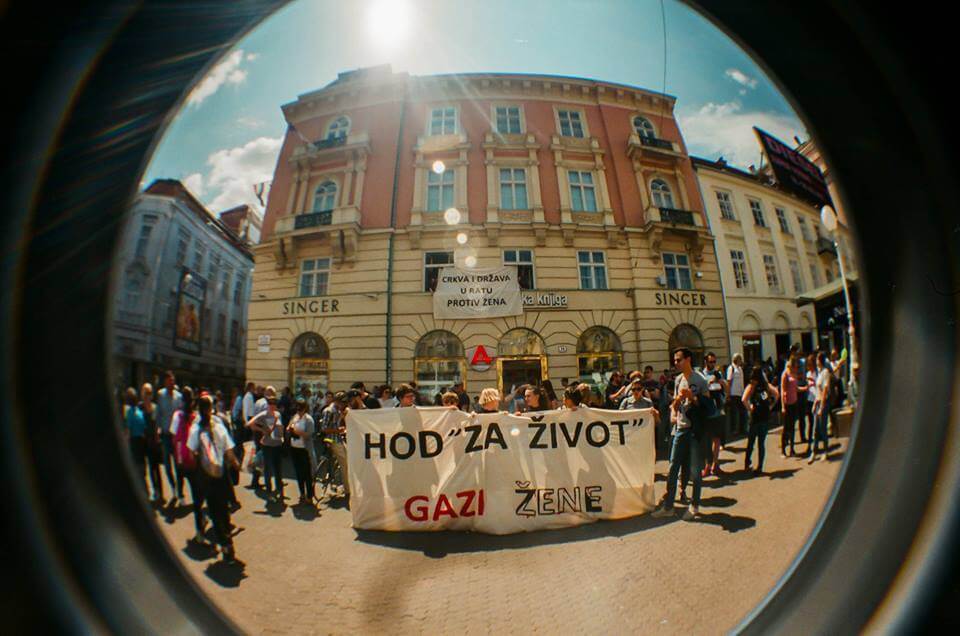
According to the suggestions of the Constitutional Court, the new law should regulate conscientious objection and develop educational and prevention measurements, all in order to make abortion the exception rather than the rule. The Court suggests obligatory consultations where women could be educated about information on pregnancy (health service, workers rights for pregnant women and mothers, accessibility of the nursery services, safe sex, birth control etc.). This could potentially end up in a mess. But, what will really change in the new law remains unclear.
In the last few years in Croatia, the question of abortion became the battlefield for moral debates among the neoconservatives. But for a long time in Yugoslavia and Croatia, abortion was considered as a granted women’s right and part of the basic health service. Feminists are fighting to bring the question of abortion into the field of the fundamental reproductive rights and women’s health care. This year again during the Night March we will demand free abortion: only free abortion makes abortion accessible to everyone. Of course, conscientious objection shouldn’t have a place in medicine!
Statistics show that every 15 minutes, one woman in Croatia experiences violence. Femicide is on the rise, and recent divisions and obstructions over ratification of the Istanbul Convention are showing us that the state and Church are participating in this. What do you see as their responsibility?
The responsibility of the state is everywhere. Firstly, in prevention, secondly, in advocating against violence, thirdly, in support for victims and a proper punishment system for abusers, and finally, in changing the discourse with regards to reporting about violence.
In the past 25 years, the Croatian state has done the minimum, and the very few changes that actually did happen were initiated under the pressure of civil society organizations and international institutions. That actually means that 90% of the struggle relies on civil society while the police, judiciary, social services, health services and educational services barely collaborate.
The influence of the Catholic Church simply shows the lack of responsibility and weakness of the state. The “traditional values” promoted by the Church are directly linked with the notion that violence is not treated as a serious problem. Instead, as a result of these processes, we can see that women are being discouraged from reporting violence. At the same time, the number of murdered women is increasing every year. These dangerous tendencies are showing that, over the past few years, an already weak system has been pretty much demolished.
Of course, the Night March is not the only purpose of fAKTIV. As feminist activists, how do you engage and act during the year?
We are constantly trying to admonish regressive politics! Seeing the Church and their side organizations fighting to ban abortion and using the term “fight for life”, we see our main role in warning society and making sure that it is clear that their fight could lead to the death of numerous women. The clash around the Istanbul Convention has been characterised as a “cultural war”, which is why we need to deconstruct these conspiracy theories around “gender ideology” in the convention.We have been advocating for the convention since our first public intervention, Take responsibility for murders of women, which was organized in the middle of an escalation of violence against women when several women were murdered by their male partners and family members. What strikes us as especially important is to educate journalists and the media on how to report about violence against women.
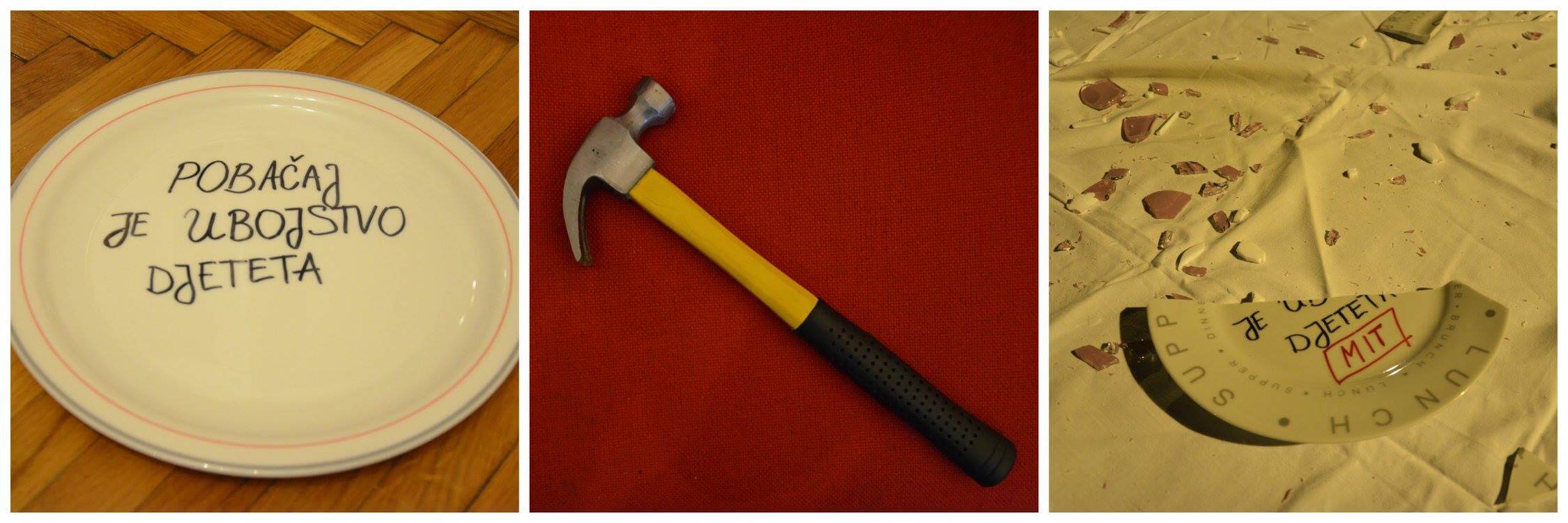
But, our activities are not only reactions to certain events. We are often taking to the streets and organizing guerrilla actions. We held a workshop around feminist self defence and protection, different discussions about unpaid and reproductive labour and a (self)organizing workshop for women from unions. One action, for instance, involved smashing plates in front of Zagreb Cathedral, illustrating how easily their myths about abortion can be smashed. As a collective, we are collaborating with different platforms. A recent one was with the Platform for reproductive rights, participating in the protest for accessible and free abortion.
Certainly it is true that our collective is inseparable from the Night March. After all this is our most important and most loved activity. On a symbolic and real level, 8 March is the meeting point of struggle for a better world. Individual struggles, either for women’s rights, or for public resources and services, or for adequate working conditions, or freedom and autonomy – are all part of one struggle. The Night March is a substantial part of that. We are fighting for our rights today, but also for the rights of the generations that are yet to come.
*Lead image: last year’s Night March finale, gathering at Zrinjevac park in Zagreb. Credit: Luka Pešun. All rights reserved
![Political Critique [DISCONTINUED]](https://politicalcritique.org/wp-content/uploads/2015/09/Political-Critique-LOGO.png)
![Political Critique [DISCONTINUED]](https://politicalcritique.org/wp-content/uploads/2015/09/Political-Critique-LOGO-2.png)